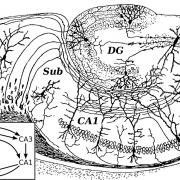Context-dependent processing can reduce a factorial explosion of possible relations between objects in a scene to a tractable set of possibilities that can be dealt with using more resource-intensive processing. The problem that this project will focus on is how to perform unsupervised identification of context while still representing variability within a context.
Place cells in the hippocampus respond when an animal is in a given location in a given context. The hippocampal representation “remaps” when introduced to different contexts. In much of the previous work on the subject, the definition of context has often been taken to be self-evident; generally defining each room as a different context. This definition overlooks many important complexities and fails to provide coherent predictions of when remapping occurs. To appropriately define context identity, we must ask what the purpose of context definition is. The proposal here is that context identity tells you something about the prior distribution of expected events; in other words, the rules that apply in a given situation. We will develop a framework for performing hierarchical Bayesian inference over 1) context segmentation and 2) context identity given that segmentation.
Using this framework, we hope to accurately predict the circumstances under which the hippocampus infers context switching. The framework should also provide insights on the nature of the neural implementation of this computation. Developing such a theory could have applicability to context-dependent processing in many modalities, helping to answer questions like “what happens next” in an efficient and appropriate way.
Context-Dependent Processing in Rodent Hippocampus
Postdoctoral Associates and Fellows:

